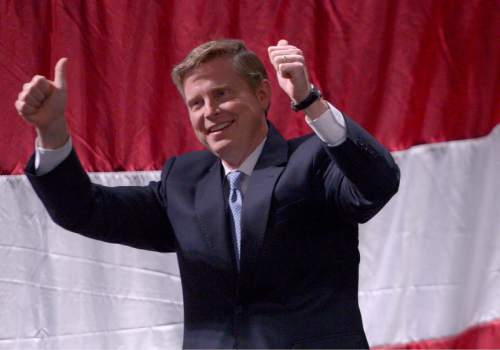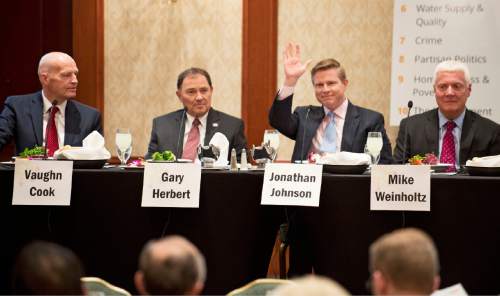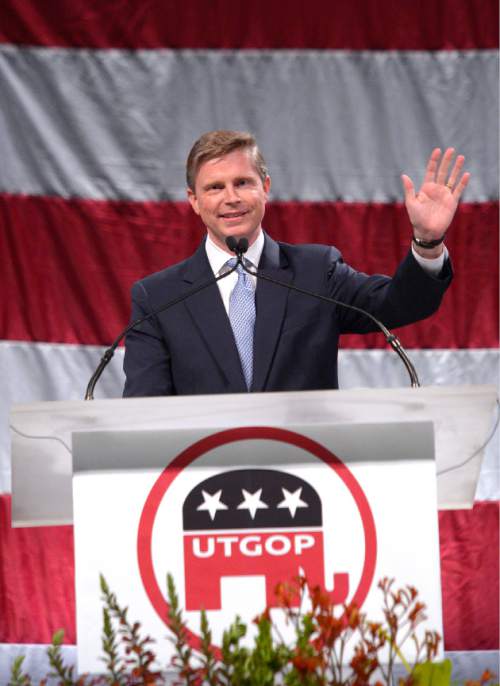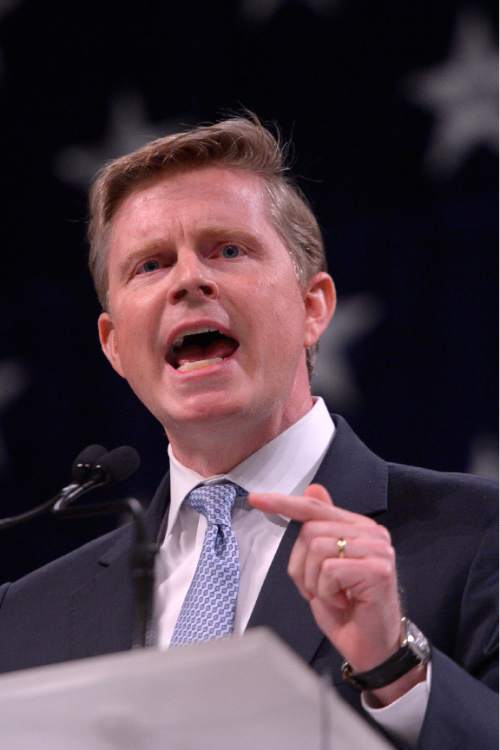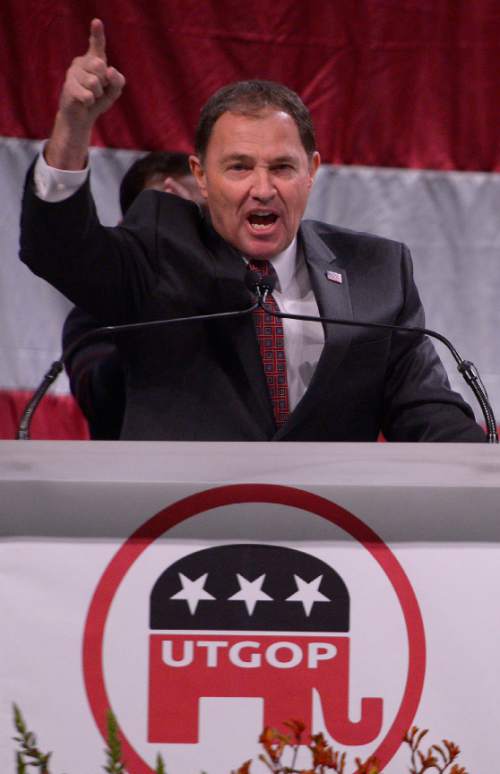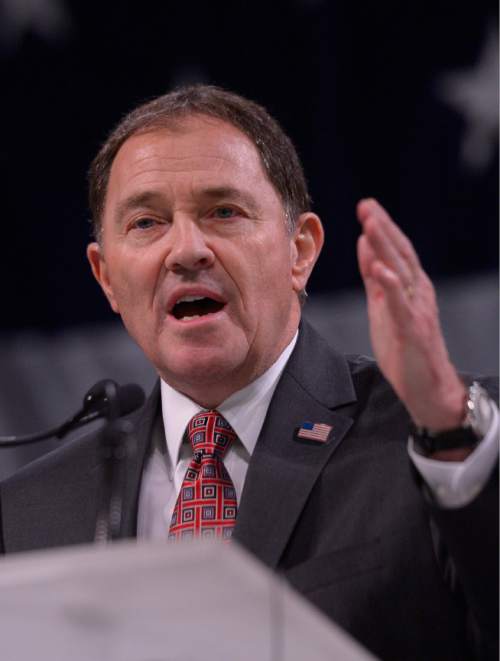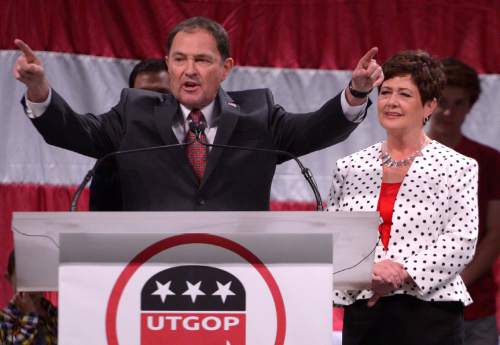This is an archived article that was published on sltrib.com in 2016, and information in the article may be outdated. It is provided only for personal research purposes and may not be reprinted.
Jonathan Johnson's campaign manager had a hunch things might go his candidate's way against Gov. Gary Herbert at the state Republican convention Saturday because there weren't enough cowboy hats.
Team Herbert had been handing out white cowboy hats at his convention booth to supporters, but as Dave Hansen scanned the crowd, he wasn't seeing as many wide brims as he would have expected.
Johnson surprised many — hammering Herbert for raising taxes, gathering signatures to get on the ballot rather than just going to the party convention, and accusing the governor of turning over control of Utah schools to the federal government — and riding that message to a 55-45 percent victory among the GOP delegates.
Hansen said there is no doubt that the convention win gives Johnson momentum heading into the eight-week sprint to the June 28 primary.
"I think he has shown that he can win and that's what a lot of voters wondered, 'We like what he says, but can he actually win?' And he showed it at convention that he can," Hansen said Monday.
Marty Carpenter, spokesman for the Herbert team, sees it differently. He said Johnson's 55-45 percent convention victory is now wiped off the scoreboard and the race starts fresh.
The campaign now shifts its target audience and its communication tactics from the 4,000 delegates to the more than 600,000 registered Republicans eligible to vote in the primary.
That audience, Carpenter said, is likely to be more receptive to the governor's record on the economy and education and less angry at the governor over some hot-button issues.
"The issues that the larger base of Republican voters care about align more directly with what the governor has done," Carpenter said, "specifically, the economic issues, how strong Utah's economy is, with very low unemployment and high job-creation numbers."
Indeed, the question now becomes how well Johnson's message that was embraced by the 4,000 conservative party activists who served as delegates will be received by the broader population of primary voters.
A recent study by the nonpartisan Utah Foundation found that the delegates tend to be considerably more conservative than the general Republican voter pool. But primary voters fall somewhere in the middle, said Steve Kroes, president of the foundation.
"It's another shade of party zeal, you might say," Kroes said.
So Johnson's pledge to sue the federal government to demand ownership of 30-plus million acres of federal land within Utah's borders might play better among Republican primary voters than general election voters, but not as well as it would among the more conservative delegates.
Issues like taxes and spending, however, were a top priority to Republicans of all stripes, and they will probably be a good issue for Johnson, Kroes said, although Utah's tax burden generally is lower than it was when Herbert took office.
Hansen said he doesn't see the campaign changing its message heading into the primary.
"It's a different ballgame, but at the same time, the messages that appealed to voters in the convention are pretty much the same messages that are going to be appealing to voters out there in the primary election," Hansen said. "Common Core, taxes, the federal government intrusion into what's happening in Utah and the lands issue."
Examples of incumbents being knocked off in primaries are few and far between. Four years ago, Hansen was campaign manager for Sen. Orrin Hatch, when Hatch won a primary against state Sen. Dan Liljenquist.
Six years ago, a tea party uprising swept Sen. Bob Bennett out of office at the Republican convention. In 2004, then-Gov. Olene Walker was ousted after failing to make it out of the convention. And in 2000, Gov. Mike Leavitt, seeking a third term, was forced into a primary with a relatively unknown challenger, whom Leavitt trounced in the primary.
The exception is Rep. Jason Chaffetz, who forced incumbent Rep. Chris Cannon to a primary and then beat him handily in the June matchup in 2008.
Carpenter said he believes the governor has solid support among the rank-and-file Republicans, and he points to a poll done two weeks ago for Utah Policy by Dan Jones & Associates — Herbert's polling firm.
It showed Herbert leading Johnson 72 percent to 13 percent among Republicans. Johnson dismissed the poll, saying the pollster was "bought and paid for" by Herbert's campaign.
The Herbert campaign outspent Johnson by a margin of nearly five to one as of the most recent disclosures, which were released a week before the convention. Carpenter said the Herbert team tried to spend its money in a way that would help it in a primary, not just the convention.
Despite spending so much money, Herbert will still have a huge financial edge. Herbert had nearly $800,000 in the bank, according to his last campaign report. Johnson, chairman of Overstock.com, had less than $11,500 remaining.
Hansen said he feels better about spending what he needed to make it to the primary instead of keeping money in the bank and getting knocked out at the convention.
He said the campaign will be able to raise what it needs to be competitive in the primary.
"We're not going to try to match him dollar for dollar," said Hansen. "We know what it's going to take to accomplish what we need to do, and I'm confident we're going to be able to raise that money and we'll have the money to do programs we need to do to win."
Twitter: @RobertGehrke


